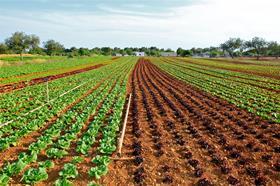
An influential committee of MPs has called on the government to provide more details on its plans for the future of UK food production.
Responding to Defra’s Health & Harmony consultation paper, the Environment, Food & Rural Affairs Committee called on the government to take a number of steps to give farmers the best chance of navigating Brexit successfully.
To offer farmers more clarity, it wants Defra to confirm the timing and length of the “agricultural transition” period that gives farm businesses a reasonable time to plan and adapt; clarify the status of cross-compliance and the “greening” conditionality during the transition period; and confirm that all existing environmental schemes will be supported to their completion.
It also wants Defra to produce a farm productivity plan by May 2019 at the latest to include, among other things, an investigation of new tax breaks to assist farmers to invest in technology, details of capital grant support, funds for collaborative working, improved mobile and digital infrastructure, and clarification over the form and funding of the successor to the agri-tech fund.
Other key points in the Efra report include a call to support healthy food under the new model of awarding payments to farmers and bringing forward changes to Government Buying Standards to ensure greater use of healthy, affordable, British food in government procurement.
On horticulture specifically, the report highlights the fact that the government has not clarified if the EU Fruit & Vegetables Regime will be continued or replicated after 31 March 2019. Without such a scheme, it adds, smaller producers may go out of business.
'Absence of detail'
Speaking about a key plank of the government’s future strategy – public money for public goods – the report states that such a system is flawed from the start without adequate funding for policing with an independent inspection regime.
The report concludes: “We welcome the level of ambition in Defra’s consultation on the future for food, farming and the environment and support its aim to create a new funding model for agriculture based on using public money to pay for public goods. It should seek to deliver public support for the integration of managing the land for environmental benefits and profitable food production.
“We are, however, concerned at the absence of detail in the consultation. Too many central tenets of the policy remain unclear. Without clarity on funding, timing and delivery of the future agricultural policy, there is a risk that Defra’s welcome ambitions will not be met. We look forward to receiving clarification and the opportunity to provide pre-legislative scrutiny well before the introduction of the Agriculture Bill.”
In response to the report’s findings, Emma Hockridge, head of policy for farming and land use at the Soil Association, said: “We strongly support the Committee’s recommendation that public health be recognised and rewarded as a public good in the context of agricultural payments – public health should be one of the defined ‘purposes’ of the Agriculture Bill and should be integrated into all food and farming policy.
'In practical terms, that should include an end to the routine, preventative use of antibiotics in farming, more support for British and organic fruit and vegetable production, and harnessing the full power of public procurement to create new local markets for British farmers and ensure school children and hospital patients are provided with healthier, higher-quality, sustainably produced food.
“We also welcome the committee’s recognition that farmers urgently need more clarity on the detail of future policy. As one part of that, we want to see a bold commitment to the UK becoming a world-leader in organic farming. That would benefit nature and the environment, improve animal welfare, and create opportunities for farm businesses to innovate and thrive. It would also help to show that there does not have to be a trade-off between food production and environmental protection.”
NFU president Minette Batters said the findings would be welcome news for farmers and growers wanting clarity over Brexit and future spending for farming. 'The report’s recommendation that the government does not enter into trade agreements that allow food imports that do not meet our environmental, welfare and food safety standards, is particularly welcome,' she added. 'It is vital that British farming’s produce and contribution to the nation is not undermined.
'We agree that it is vital that the Efra committee carries out pre-legislative scrutiny before the formal introduction of the Agriculture Bill.'
'Opportunity for positive change'
And CLA president Tim Breitmeyer said: “Brexit brings major opportunities for positive change in farming, but success depends on a carefully planned transition. We are pleased MPs have added their voice to our call for government to focus on a plan for boosting farm profitability. Getting this aspect of post-Brexit right must be considered to be a vital precondition of any moves to remove the basic payment system with a clear strategy, worked up and funding allocated.
“The committee provides a timely reminder that production of healthy food is, and must remain, the most important land use in our countryside. A dynamic, progressive and sustainable farming industry can work alongside significant improvement in our environmental delivery, and a vision for a long-term policy to replace the Common Agricultural Policy must have sustaining this balance as its overriding objective.”






No comments yet